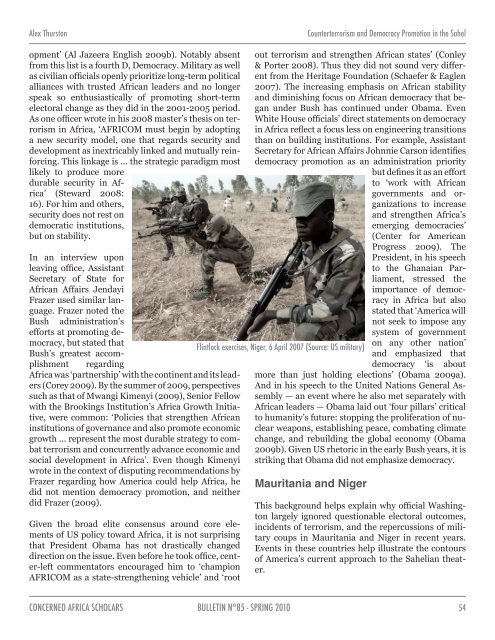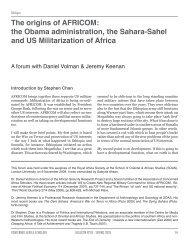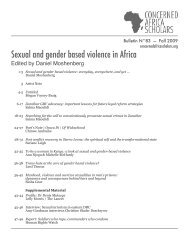Western Sahara and the United States' geographical imaginings
Western Sahara and the United States' geographical imaginings
Western Sahara and the United States' geographical imaginings
Create successful ePaper yourself
Turn your PDF publications into a flip-book with our unique Google optimized e-Paper software.
Alex Thurston Counterterrorism <strong>and</strong> Democracy Promotion in <strong>the</strong> Sahel<br />
opment’ (Al Jazeera English 2009b). Notably absent<br />
from this list is a fourth D, Democracy. Military as well<br />
as civilian officials openly prioritize long-term political<br />
alliances with trusted African leaders <strong>and</strong> no longer<br />
speak so enthusiastically of promoting short-term<br />
electoral change as <strong>the</strong>y did in <strong>the</strong> 2001-2005 period.<br />
As one officer wrote in his 2008 master’s <strong>the</strong>sis on terrorism<br />
in Africa, ‘AFRICOM must begin by adopting<br />
a new security model, one that regards security <strong>and</strong><br />
development as inextricably linked <strong>and</strong> mutually reinforcing.<br />
This linkage is ... <strong>the</strong> strategic paradigm most<br />
likely to produce more<br />
durable security in Africa’<br />
(Steward 2008:<br />
16). For him <strong>and</strong> o<strong>the</strong>rs,<br />
security does not rest on<br />
democratic institutions,<br />
but on stability.<br />
In an interview upon<br />
leaving office, Assistant<br />
Secretary of State for<br />
African Affairs Jendayi<br />
Frazer used similar language.<br />
Frazer noted <strong>the</strong><br />
Bush administration’s<br />
efforts at promoting democracy,<br />
but stated that<br />
Bush’s greatest accomplishment<br />
regarding<br />
Africa was ‘partnership’ with <strong>the</strong> continent <strong>and</strong> its leaders<br />
(Corey 2009). By <strong>the</strong> summer of 2009, perspectives<br />
such as that of Mwangi Kimenyi (2009), Senior Fellow<br />
with <strong>the</strong> Brookings Institution’s Africa Growth Initiative,<br />
were common: ‘Policies that streng<strong>the</strong>n African<br />
institutions of governance <strong>and</strong> also promote economic<br />
growth ... represent <strong>the</strong> most durable strategy to combat<br />
terrorism <strong>and</strong> concurrently advance economic <strong>and</strong><br />
social development in Africa’. Even though Kimenyi<br />
wrote in <strong>the</strong> context of disputing recommendations by<br />
Frazer regarding how America could help Africa, he<br />
did not mention democracy promotion, <strong>and</strong> nei<strong>the</strong>r<br />
did Frazer (2009).<br />
Given <strong>the</strong> broad elite consensus around core elements<br />
of US policy toward Africa, it is not surprising<br />
that President Obama has not drastically changed<br />
direction on <strong>the</strong> issue. Even before he took office, center-left<br />
commentators encouraged him to ‘champion<br />
AFRICOM as a state-streng<strong>the</strong>ning vehicle’ <strong>and</strong> ‘root<br />
out terrorism <strong>and</strong> streng<strong>the</strong>n African states’ (Conley<br />
& Porter 2008). Thus <strong>the</strong>y did not sound very different<br />
from <strong>the</strong> Heritage Foundation (Schaefer & Eaglen<br />
2007). The increasing emphasis on African stability<br />
<strong>and</strong> diminishing focus on African democracy that began<br />
under Bush has continued under Obama. Even<br />
White House officials’ direct statements on democracy<br />
in Africa reflect a focus less on engineering transitions<br />
than on building institutions. For example, Assistant<br />
Secretary for African Affairs Johnnie Carson identifies<br />
democracy promotion as an administration priority<br />
but defines it as an effort<br />
to ‘work with African<br />
governments <strong>and</strong> organizations<br />
to increase<br />
<strong>and</strong> streng<strong>the</strong>n Africa’s<br />
emerging democracies’<br />
(Center for American<br />
Progress 2009). The<br />
President, in his speech<br />
to <strong>the</strong> Ghanaian Parliament,<br />
stressed <strong>the</strong><br />
importance of democracy<br />
in Africa but also<br />
stated that ‘America will<br />
not seek to impose any<br />
system of government<br />
on any o<strong>the</strong>r nation’<br />
<strong>and</strong> emphasized that<br />
democracy ‘is about<br />
more than just holding elections’ (Obama 2009a).<br />
And in his speech to <strong>the</strong> <strong>United</strong> Nations General Assembly<br />
— an event where he also met separately with<br />
African leaders — Obama laid out ‘four pillars’ critical<br />
to humanity’s future: stopping <strong>the</strong> proliferation of nuclear<br />
weapons, establishing peace, combating climate<br />
change, <strong>and</strong> rebuilding <strong>the</strong> global economy (Obama<br />
2009b). Given US rhetoric in <strong>the</strong> early Bush years, it is<br />
striking that Obama did not emphasize democracy.<br />
Flintlock exercises, Niger, 6 April 2007 (Source: US military)<br />
Mauritania <strong>and</strong> Niger<br />
This background helps explain why official Washington<br />
largely ignored questionable electoral outcomes,<br />
incidents of terrorism, <strong>and</strong> <strong>the</strong> repercussions of military<br />
coups in Mauritania <strong>and</strong> Niger in recent years.<br />
Events in <strong>the</strong>se countries help illustrate <strong>the</strong> contours<br />
of America’s current approach to <strong>the</strong> Sahelian <strong>the</strong>ater.<br />
CONCERNED AFRICA SCHOLARS BULLETIN N°85 - SPRING 2010 5




